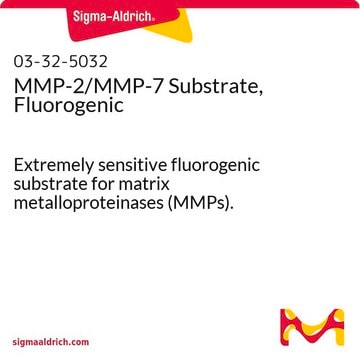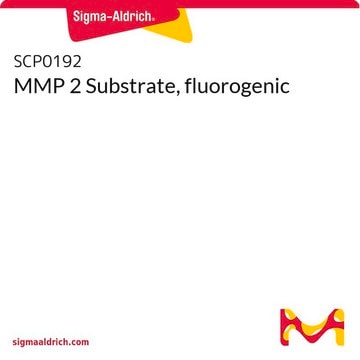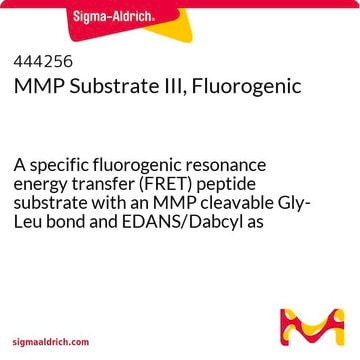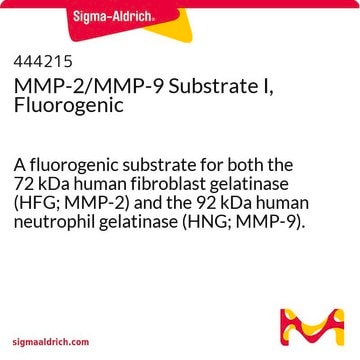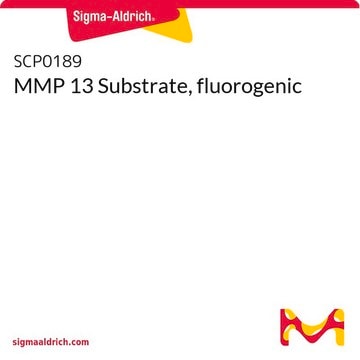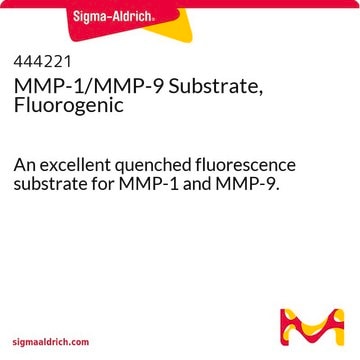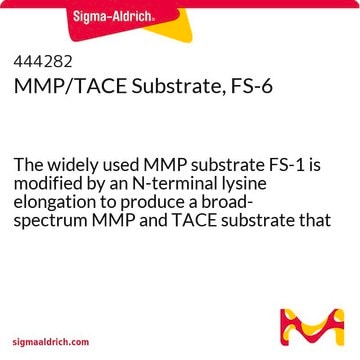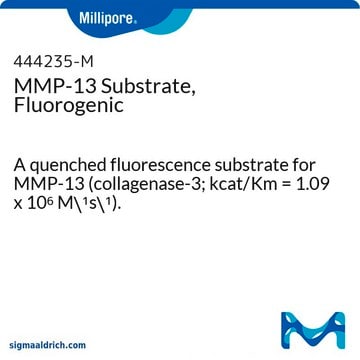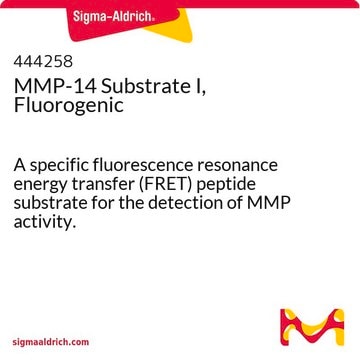SCP0193
MMP Substrate
≥95% (HPLC), lyophilized
Synonyme(s) :
FS-6
Se connecterpour consulter vos tarifs contractuels et ceux de votre entreprise/organisme
About This Item
Formule empirique (notation de Hill):
C55H80N16O16
Poids moléculaire :
1221.32
Code UNSPSC :
12352200
Nomenclature NACRES :
NA.32
Produits recommandés
product name
MMP Substrate,
Pureté
≥95% (HPLC)
Forme
lyophilized
Composition
Peptide Content, ≥75%
Conditions de stockage
protect from light
Température de stockage
−20°C
Amino Acid Sequence
MCA-Lys-Pro-Leu-Gly-Leu-DNP-Dpa-Ala-Arg-NH2
Description générale
Matrix Metalloproteases (MMPs) belongs to the zinc metalloprotease family M10. They are zinc-dependent, calcium-containing hydrolases.
Actions biochimiques/physiologiques
Matrix Metalloproteases (MMPs) are involved in extracellular matrix (ECM) degradation. MMPs regulate cellular and disease processes. They are implicated in processes such as cell proliferation, migration, differentiation, angiogenesis, anti-inflammatory response, vasoconstriction, apoptosis and host defense. Dysregulation of MMP is associated with arthritis, ulcers, encephalomyelitis and cancer.
The peptide MCA-Lys-Pro-Leu-Gly-Leu-DNP-Dpa-Ala-Arg-NH2, or FS-6, is a fluorogenic substrate for several matrix metalloproteinases (MMPs). FS-6 is a water-soluble, modified form of the well-established MMP substrate FS-1, where a lysine residue has been added to the N-terminus of FS-1. The resulting FS-6 has been reported to give a peptide with improved kinetic properties for several MMPs, including MMP-1, MMP-8, MMP-13, and MMP-14, compared to FS-1. This MMP substrate has also been described as a particularly useful substrate for the zinc metalloproteinase tumor necrosis factor-α converting enzyme (TACE or ADAM-17). FS-6 can be used to measure metalloproteinase activity in tissue culture conditions, for example, on the surface of viable cells in situ.
Code de la classe de stockage
11 - Combustible Solids
Classe de danger pour l'eau (WGK)
WGK 3
Point d'éclair (°F)
Not applicable
Point d'éclair (°C)
Not applicable
Certificats d'analyse (COA)
Recherchez un Certificats d'analyse (COA) en saisissant le numéro de lot du produit. Les numéros de lot figurent sur l'étiquette du produit après les mots "Lot" ou "Batch".
Déjà en possession de ce produit ?
Retrouvez la documentation relative aux produits que vous avez récemment achetés dans la Bibliothèque de documents.
Les clients ont également consulté
Ulf Neumann et al.
Analytical biochemistry, 328(2), 166-173 (2004-04-29)
Matrix metalloproteinases (MMPs) and the related tumor necrosis factor converting enzyme (TACE) are involved in tissue remodeling, cell migration, and processing of signaling molecules, such as cytokines and adhesion molecules. Fluorescence-quenched peptide substrates have been widely used to quantitate the
Knowledge-transfer learning for prediction of matrix metalloprotease substrate-cleavage sites
Wang Y, et al.
Scientific Reports, 7(1), 5755-5755 (2017)
MMP-12 catalytic domain recognizes triple helical peptide models of collagen V with exosites and high activity.
Bhaskaran R
The Journal of Biological Chemistry, 283(31), 21779-21788 (2008)
David J Wilkinson et al.
The FEBS journal (2021-07-17)
Matrix metalloproteinase-13 (MMP-13) is a uniquely important collagenase that promotes the irreversible destruction of cartilage collagen in osteoarthritis (OA). Collagenase activation is a key control point for cartilage breakdown to occur, yet our understanding of the proteinases involved in this
Hideaki Nagase et al.
Cardiovascular research, 69(3), 562-573 (2006-01-13)
Matrix metalloproteinases (MMPs), also called matrixins, function in the extracellular environment of cells and degrade both matrix and non-matrix proteins. They play central roles in morphogenesis, wound healing, tissue repair and remodelling in response to injury, e.g. after myocardial infarction
Notre équipe de scientifiques dispose d'une expérience dans tous les secteurs de la recherche, notamment en sciences de la vie, science des matériaux, synthèse chimique, chromatographie, analyse et dans de nombreux autres domaines..
Contacter notre Service technique